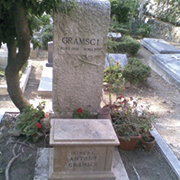A ninety-minute cycle to poems by Pier Paolo Pasolini is Manfred Trojahn’s latest work. It will be premiered in December in Rome at the “Nuova consonanza” festival. In an interview with Marie Luise Maintz he explains his fascination with Gramsci and Pasolini.
[t]akte: With Le ceneri di Gramsci after Pasolini, you’re realising a project which has long been in the planning. Why now?
Trojahn: Gramsci’s ashes have pursued me – or is it me pursuing the poem? – since its publication in German at the beginning of the 1980s. Now the text seems to be a burning imperative to me. For we, like Pasolini at that time, have chosen art and not socially useful work. Today we see the result of this decision, so right for an artist, but so catastrophic for society – but one which will be made in the same way time and time again. It is one of the themes running through my life, and I am really glad that I now have the opportunity of realising it in Rome, in Italy, at a time when this text is still greatly needed.
The poem “Le ceneri di Gramsci” gave the title to Pasolini’s first volume of lyric poetry in 1957, with which he won the Viareggio Prize. A visit to Antonio Gramsci’s grave in Rome, the guiding intellectual force of the Italian Communists, becomes the starting point for a contemplation of ideology and passion in your work. What is it that interests you about this text?
Gramsci is buried in the Cimitero acattolico in Rome, where I often also visit the graves of August Goethe, Shelley and Keats – a wonderfully peaceful place. Pasolini describes himself in contemplation before Gramsci’s grave, and takes Gramsci to task for the severity of his ideology, which seems to exclude that in which Pasolini sees “life”. The liberation from this severity allowed Pasolini to become an artist. Gramsci was a philosopher who paved the way for the founding of the Communist Party of Italy, because he saw in it a socially useful opportunity.
It is this conflict in itself which interests me, the freedom of life which one needs as an artist to be able to achieve anything in this bourgeois world, and to defend oneself against constraints, even where we recognise them as socially justified. It is about a choice – and this has consequences which it is ultimately concerned with.
What interests me is the dichotomy, or better still, the dialectic of the intellectual approach in this poem, because I am certain that this idea describes the central problem which art has been labouring under since the Enlightenment. But it is also, so to speak, a private reaction, for in the 1970s one had to assert oneself against ideological restrictions which regarded precisely that aspect of “passion” as politically untenable and fought against it most fiercely. Of course the text is again particularly relevant in present times. The question about the role of art in “turbo capitalism” is, however, not central to my thinking, but when we reflect upon trying to improve the world today it would certainly be fruitful to turn to a consideration of whether Gramsci’s social concepts contain something more futuristic than we could imagine with the collapse of left-wing ideas 25 years ago. Naturally such a consideration also has to touch upon the role of art – and so we immediately come up against the “eternal” problem again, the dialectic of “passion” and “ideology” which Pasolini also posed in the areas of sexuality, the bourgeois way of life and intellectuality.
A preview of the composition?
I’m setting the complete text. I don’t see a possibility of shortening it anywhere, because the density of images and the logic of the text would be destroyed. The form which I use has nothing to do with “Lieder” in the sense of art song – in Italy you would probably call them “canti”, in France “mélodie”, and in English “song”. It’s about reflective monologues, six in number, which revolve around a theme in a tremendous number of images and stories. The most significant topics are the central messages of the text, such as, for example, the question to Gramsci about whether he probably thought that a work of art could no longer be completed out of true passion now that the end of history has occurred.
(from [t]akte 2/2013)
(translation: Elizabeth Robinson)



